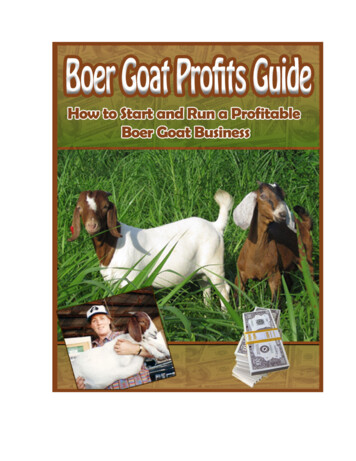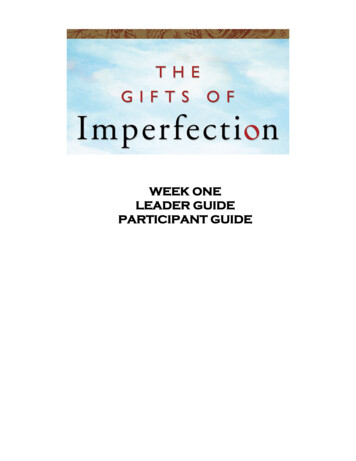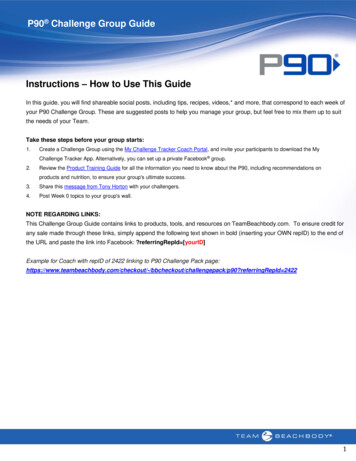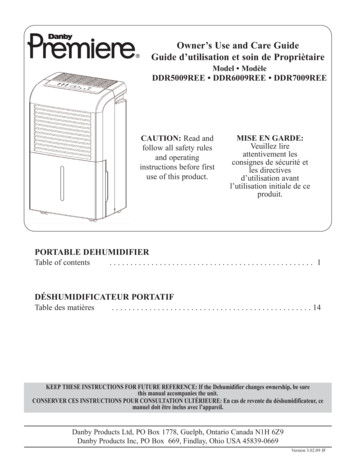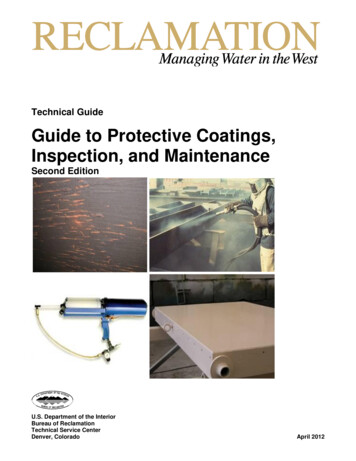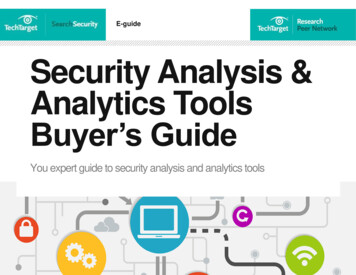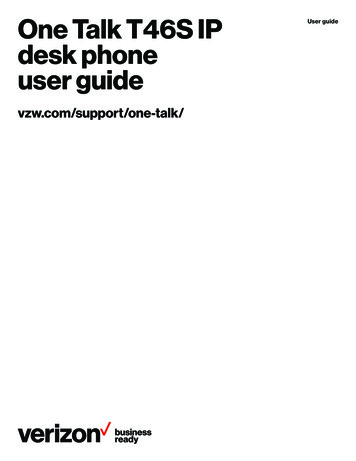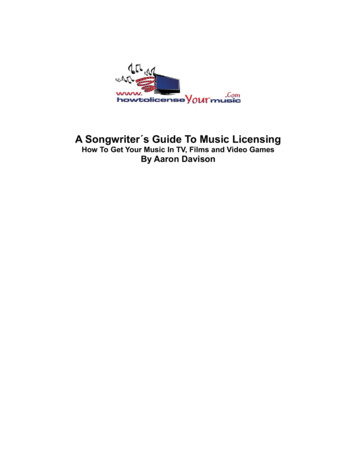
Transcription
A Songwriter s Guide To Music LicensingHow To Get Your Music In TV, Films and Video GamesBy Aaron Davison
Table Of ContentsAn Introduction To Writing Songs For TV And FilmsHow I Got StartedWhy Your Music Is NeededWhy Licensing Your Music Is Much Easier Than Getting A Record DealGetting PaidHow Much Money You Can Make By Licensing Your MusicDiversify Your Musical PortfolioPerforming Rights OrganizationsHow To License Music InternationallyWhy Musicians Should Actively Pursue Music Licensing OpportunitiesHow To Get Your Music In Film and TelevisionPublishing Royalties ExplainedWhat Happens When You Publish Your MusicSelf Publishing Your MusicTips For Getting Your Songs Placed In TV and FilmsOther TipsNon Exclusive Re-Titling DealsPassive IncomeFinding The Right Music Library Or Music Publisher For YouSmall Publishers VS Large LibrariesAn Interview With Singer/Songwriter Susan HyattBusiness Etiquette In The Music Licensing BusinessA Proven Script For Calling Music Licensing CompaniesHow To Make Contact With Music Libraries And Music PublishersCultivating Relationships That Will Lead To SuccessThe 90 Day ChallengeCue Sheets ExplainedBuyout Library DealsRoyalty Free MusicMusic Used In CommercialsWriting Ad JinglesExclusive VS Non Exclusive ContractsCopyrighting Your MusicAn Interview With David Levy Of Levy Music PublishingMusic Clearance DefinedHow Licensing Your Music Can Move Your Career ForwardInstrumental Versions Of Your SongsMusic Licensing And The Future Of The Music BusinessHow To Stay Motivated As A SongwriterYou Have To Be In It To Win It
An Introduction To Writing Songs For TV And FilmsLicensing music for use in TV and Films, and other media outles such as videogames and advertising, is an aspect of the music business that all musiciansshould be aware of. As record sales continue to decline and as the wholerecording industry is scrambling to figure out where the future of the musicbusiness is headed, music licensing is increasingly becoming a more importantsource of revenue for both artists and labels.Music licensing is currently a 20 billion dollar a year business. With the everincreasing expansion of cable TV channels as well as a variety of other newmedia outlets, there is a growing demand for music that can be affordablylicensed. Popular songs come with hefty licensing fees and since manyproductions can t afford to license every hit song they might want for theirproduction, there are many opportunities for independent musicians to licensetheir music and both make money and gain more exposure for themselves atthe same time.Music licensing, in addition to being a big business, is also great becauseregardless of what stage of your career you re in, where you live, how old youare, etc. music licensing is always a great way to earn extra money with yourmusic. There is also no real barrier to entry for songwriters interested inlicensing their music. It is about as level of a playing field as you re going to findin the music business. You still of course need to know how the businessoperates and who the people are working in the business. These areas areprecisely what this ebook and the companion directory address.How I Got StartedI've been writing songs for over fifteen years. I attended Berklee College ofMusic in the mid 1990's where I majored in Songwriting. It was during my time atBerklee that I was first introduced to the concept of writing songs for film andtelevision as a career. Although at the time I was mildly intrigued by thepossibility of this career path, it wasn't until eight years later that I decided toseriously entertain the idea. At this point I had played in a variety of bandsand had still yet to achieve my elusive goal of becoming a rock star.
One day while surfing the Internet I came across an article about a BerkleeAlumnus who made a living, in part, writing songs for Film and Television. Thisarticle inspired me for the first time to make a serious effort to pursue the craft ofwriting music for Film and Television. I realized that during all the time I hadspent chasing my dreams of rock and roll stardom, I had passed over manymore attainable goals that could have helped me make a living doing what I loveto do most, playing music. I also realized that accomplishing these goals wouldprobably actually get me closer to where I wanted to be. Within six months ofreading the article I had signed my first licensing deal with a publisher.The first time I heard my music on Television was truly one of the most excitingmoments of my life! After years of writing songs, taking guitar lessons andplaying in bands, my music had, in an instant, been heard all over the world. It'shard to explain just how thrilling it is to see something you've invested so muchhard work and passion in pay off. And beside the emotional high of hearing mymusic on Television I was also thrilled when a few months later I received acheck for over 800.00 - for 55 seconds of airtime! This was in addition to 400.00 I received upfront for the rights to use my song. Like I said, I didn'treally start out with the goal of writing music for Film and Television, but I'vealways had the goal of getting my music heard and getting paid for it. Thanks tomany different placements over the last few years, I've been able to accomplishboth of these goals.Why Your Music Is NeededIf you've never paid attention to the background music used on television showsbefore, start listening! Music is a huge part of both TV shows and Films. It'sused to enhance scenes and story lines. It's easy to ignore if you're not activelylistening for it - even as a musician. But it's everywhere. Commercials, TVShows, Video Games, Films, Websites and other mediums all use music as animportant part of their presentation.Much of the music that is used comes from independent musicians. Songwriterslike you. The reason for this is that well known songs come with hefty licensingfees. It can cost tens of thousands of dollars to license a well known song. Thisis why many music supervisors turn to independent music as a cost effectiveway to use music in their productions. Depending on the production and budget,independent music is often used in lieu of "hit" songs. This provides a greatopportunity for the independent musician looking to get started in the musicindustry. Think of it as the "minor leagues" of the music industry.Why licensing your music is much easier than getting a record dealWhatever your goals are with respect to your music career, licensing your music
for use in TV and Film will help propel your career forward. Whether you'relooking to ultimately land a major label record deal and play stadiums or if you'rejust interested in making a little extra money from your music, licensing yourmusic will benefit your music career by helping you both earn more money fromyour music as well as gain more exposure.Music licensing is a lot easier to get into than the recording industry for a varietyof reasons. One of the main reasons is that there is a lot less at stake in themusic licensing business than there is in the recording industry for theprofessionals working behind the scenes. When a major record label takes on anew artist there is typically a LOT of money invested in the promotion of theartist. There is a lot at stake and there is a lot to potentially lose if the artist beingsigned is not successful. This means that A&R reps have to be extremelyselective in signing artists - their jobs and paychecks are at stake.In the music licensing business there isn't the same sort of pressure to get itright every single time. If a music publisher likes your music and they present itto a music supervisor for a project and the music supervisor doesn't like yoursong - they simply move on to the next song and artist. No harm done and nomoney lost. This means that music publishers and even supervisors can take alot more chances when it comes to working with new and unestablished artists.Of course music publishers still need to present quality music on a regular basis,but they are a lot more likely to take a chance on a new and unknow artist thanrecord labels are. The downside of this reality is that as an independent artistpursuing music licensing opportunities, you will be responsible for coveringthings like recording costs and you will need to work hard to promote your musicand make sure your music gets heard by the right people.So if you haven't already started licensing your music - what are you waitingfor? You have to be in it to win it as they say and now is as good of time as anyto get started in the business. So, let's talk more about how the business worksand the steps you can take to get started.Getting PaidTelevisionFor television shows, each time a song is used on air, you generally earnincome twice. First, you will generally (although not always) receive a licensingfee, which is a fee that is paid upfront for the right to use your song in whateverbroadcast your song is being used in. Additionally you will also receive what'scalled a performance royalty after your song has aired. The royalty amountvaries based on a number of factors including the length of the segment as well
as how prominently it is used.Each performance generates both a writer's and publisher's royalty, which aretwo halves of what our collectively known as a performance royalty. If you workwith a music publisher you both essentially get half of the entire royalty. If youare able to place the music without the aid of a publisher you retain both thewriter's share and publisher's share of the performance royalty. Again, theamount varies but to give you an example, the first song I had placed was in ascene that lasted about :55 seconds on a daytime drama in 2002. The royaltycheck I received for the placement was over 800.00 and in addition I alsoreceived a licensing fee in the amount of 500.00. So for one song that aired forless than one minute on a daytime television show I made 1,300.00! Not badfor less than a minute of airtime.How much money you can make by licensing your musicWhen it comes to licensing your music for use in television, you can make aslittle several hundred dollars, or as much as several thousand dollars perplacement. I have received as little as about 350.00 for one song that wasused briefly in a daytime TV show and as much as 3,000.00 for a song thatwas used in a different show and featured very prominently. Of course thesefigures are based on when the show initially airs and if and when a TV show isrebroadcast you receive another check! I know one writer who still receiveschecks for a song he wrote for an HBO movie thirteen years ago!FilmsTheatrical releases in the United States do not generate performance royaltieswhen they are shown in theatres. However the licensing fees songwriters earnfor these placements are typically much higher. When it comes to major motionpictures, unknown independent writers usually receive at least three to fourthousand dollars (or more) per song used for feature films. Although there areno performance royalties for films in theatrical release if you're song is used in asoundtrack you will receive royalties for CD sales and if and when the film isplayed on television you will receive performance royalties for your music at thattime.Diversify Your Musical PortfolioI get a lot of questions regarding how much money can be made from musiclicensing. There are many variables so there really isn't a one size fits allanswer. I know several musicians who make very good full time, sixfigure incomes from music licensing, and I know quite a few more that makesubstantial part time incomes that they use to supplement their total income.The latter is the strategy that I have implemented in my career and it has served
me very well over the years.As record labels continue to flounder and as the internet continues to make iteasier to reach new music fans, it's become apparent that musicians are in anew and unique position. Creating a viable and sustainable music careerwithout the assistance of a behemoth record label has never been easier. Notthat it s a piece of cake. But it's doable, and more and more musicians that Iknow are taking matters into their own hands and creating their own fate. It'sreally inspiring to watch!Licensing your music should be a part of your overall career strategy. I can'tthink of a reason any musician, regardless of what stage they're at, wouldn twant to take advantage of licensing their music in TV and Films. If you aremanaging yourself and you're also concentraing on developing a performingcareer, then you ll need to manage your time accordingly. But I would suggestspending some time, maybe an hour or so a day, pursuing licensingopportunities.Keep in mind that although like anything else, you'll need to continue working onthe licensing aspect of your career, it will be easier to maintain over time, as youbecome more established. Working with a publisher, if that's the route you go, issort of like working with a manager in the context of the music licensing niche.So although it might take you some time to find someone to represent you whenyou are getting started, once you do you'll have someone that you'll be workingin partnership with who will be helping you get your music into the right handson an ongoing basisPerforming Rights OrganizationsIn order to get paid performance royalties when you license your songs for usein TV you need to register your songs with whatever performing rightsorganization you belong to. TV shows submit what are called cue sheets toperforming rights organizations that list what songs are used in their broadcasts.These cue sheets are then delivered to whatever Performing RightsOrganization the writer of the song is a member of and the Performing RightsOrganizations distribute royalties to its writers based on how the song is used.The creator of the song being broadcast is compensated through what's knownas
Music in the mid 1990's where I majored in Songwriting. It was during my time at Berklee that I was first introduced to the concept of writing songs for film and television as a career. Although at the time I was mildly intrigued by the possibility of this career path, it wasn't until eight years later that I decided to seriously entertain the idea. At this point I had played in a variety of .
